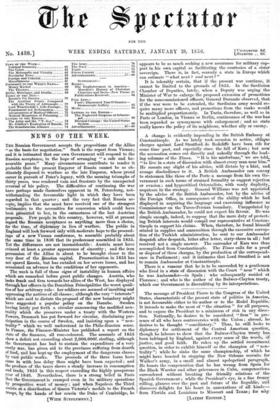NEWS OF THE WEEK.
TEE Russian Government aooepts the propositions of the Allies " as the basis for negotiation." Such is the report from Vienna; and it is intimated that our own Government will respond to the
Russian acceptance, in the hope of arranging " a safe and ho- nourable peace." Many circumstances contribute to render it probable that the present Emperor of Russia cannot be so ob- stinately disposed to warfare as the late Emperor, whose proud
career in pursuit of Peter's legacy, with the seeming triumphs of thirty years, was rendered vain and frustrate by the unexpected
reversal of his policy. The difficulties of continuing the war have perhaps made themselves apparent in St. Petersburg, not- withstanding the favourable light in which they have been
regarded in that quarter ; and the very fact that Russia ac- cepts, implies that she must have received one of the strongest testimonies to the necessities for concession which could have been presented to -her, in the earnestness of the last Austrian proposal). Few people in this country, however, will at present regard the Russian acceptance as anything more than a choice, for the time, of diplomacy in lien of warfare. The public in England will look forward only with moderate hope to the proceed- ings of a new Vienna conference, to assemble probably about the same time in 1856 that its predecessor assembled in 1855. Yet the differences are not inconsiderable : Austria must have evinced at least a greater appearance of sincerity ; and the iron persuasion of the Allies is about to be brought closer to the very door of the Russian capital. Procrastination in 1855 has not spared Russia, but has entailed on her severe losses, and has occasioned an advance in the conditions of her opponents. The week is full of those signs of instability in human affairs which are remarked before great public changes. Austria, who looks frank and firm towards her allies of the West, has displayed through her officers in the Danubian Principalities the worst quali- ties of her arbitrary rule : her soldiers are accused of insulting and oppressing the natives of all classes ; although the very " interests" which are said to dictate the proposal of the new boundary might have suggested a popular policy on the Danube. Sweden having lately put forth a circular announcing the modified neu- trality which she preserves under a treaty with the Western Powers, Denmark has put forward her circular, disclaiming par- ticipation in the course of Sweden, and insisting upon a " neu- trality" which we well understand in the Philo-Russian sense. In France, the Finance-Minister has published a report on the state of the finances, all rose-coloured. The accounts of 1855 show a deficit not exceeding about 2,000,0001. sterling, although the Government has had- to sustain the expenditure of a very costly war, has given aid to the provinces suffering from dearth of food, and has kept up the employment of the dangerous classes by vast public works. The proceeds of the three loans have come in with less delay than might have been expected ; and the produce of the taxes shows a steady increase in consumption and trade, 1855 in this respect exceeding the highly prosperous year of 1846. Nevertheless, there is a strong belief in Paris that the Government is cramped even in its military operations by prospective want of money ; and when Napoleon the Third assists at a distribution of Queen Victoria's medals to the French troops, by the hands of her cousin the Duke of Cambridge, he appears to be as much seeking a new assurance for military sup- port in his own capital as facilitating the courtesies of a sister sovereign. There is, in fact, scarcely a state in Europe which can estimate " what next ? and next ?"
It is tolerably certain, that if the present war continue, it cannot be limited to the grounds of 1855. In the Sardinian Chamber of Deputies, lately, when a Deputy was urging the Minister of War to enlarge the proposed extension of promotions for the noncommissioned officera, General Dinundo observed, that if the war were to be extended, the Sardinian army would re- quire many more officers, and promotions from the ranks would be multiplied proportionately. In Turin, therefore, as well as in Paris or London, in Vienna or Berlin, continuance of the war has been regarded as synonymous with enlargement ; and no state really knows the policy of its neighbour, whether ally or enemy.






























